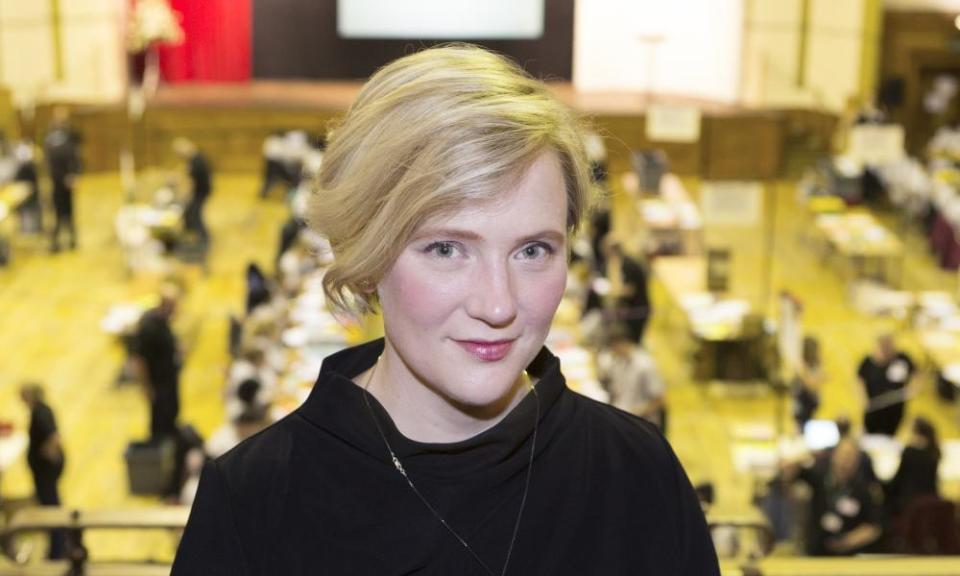Abortion rights for Northern Irish women in UK 'must be addressed'

MPs have warned that abortion rights for Northern Irish women travelling to the UK for a termination must be addressed despite the Conservative deal with the DUP, repeatedly raising their concerns during a heated debate in the Commons.
Labour MP Stella Creasy and Conservative MP Anna Soubry were among those who called on the government to permit Northern Irish women terminations in England without charge.
Women’s rights campaigners have expressed concerns about the implications of the DUP deal for any prospect of the government extending the right to an NHS termination to Northern Irish women travelling to England.
This month the supreme court narrowly ruled that women from Northern Ireland were not entitled to free abortions on the NHS in England, a judgment that coincided with talks beginning on a confidence and supply agreement between the Conservatives and the DUP. Northern Ireland has some of the most restrictive abortion laws in Europe.
The DUP agreement, published on Monday, makes no mention of the issue. But MPs in the House of Commons raised fears with the first secretary of state, Damian Green, that the government may have a tacit understanding with the DUP not to change the law in England.
“This isn’t a devolved matter, this is about when they come to our shores here, UK taxpayers and their ability to use UK services,” Creasy said. “Did the government make any commitment to the DUP about this matter when it comes to the house or are Northern Irish women simply expected to pay the price for what feels like a forced marriage?”

Other Labour MPs including Tracy Brabin, Diana Johnson and Yvette Cooper also raised concerns about the impact of the deal on any government decision to allow Northern Irish women NHS terminations in England.
Cooper called the charges for Northern Irish women “hugely unfair” and Johnson said: “[The government should] do the right thing by women who have no option but to travel from Northern Ireland ... and say those women should not be charged for accessing NHS services, which they contribute to as taxpayers.”
Green said the decision was not a matter for the UK government – despite the supreme court ruling this month that said the decision should be made by the Department of Health.
He said there were “no private or side agreements attached” to the deal with the DUP. On abortion, Green said: “This is clearly a political decision that she may want to bring about in Northern Ireland when we have a devolved executive there.”
Speaking in the Commons, Soubry said Green should treat the charges for Northern Irish women as “an entirely separate matter” from the DUP agreement, but said it was “an injustice” that they should be charged for termination in England.
“And therefore would he agree with me that it is something the government should look at because it isn’t fair that women seeking terminations from Northern Ireland should be charged by the NHS here?”
Green said again the Northern Ireland assembly was the “best place for it to be resolved” as a frustrated Soubry mouthed “it’s about here”.
Creasy said Green “did not deny abortion has been discussed” in negotiations with the DUP. “No matter how much he tries to pretend otherwise, decisions about what happens in English hospitals are a matter for the UK parliament, not Stormont,” she added.
About 50 MPs from all the main political parties have signed an amendment to the Queen’s speech to grant Northern Irish women NHS-funded abortions in England. If chosen by the Speaker, MPs will vote on the amendment later this week.
Though it is highly unlikely to pass through the Commons, supportive MPs hope it will act as a warning sign to the DUP and the government not to allow the confidence deal to impinge on future legislation on women’s rights and other social issues.
Conservative MP Sir Peter Bottomley, who has signed Creasy’s amendment, said he believed the DUP deal would have the opposite effect on abortion rights. “I think they are more likely to say yes to this change, which is a matter for England, to show they are not influenced by the deal on matters like this,” he said.
“No one is trying to change the situation in Northern Ireland, currently women can come to Liverpool or Scotland, on the so-called termination trail, and pay for a termination. This is a matter for women who cannot afford to pay, I’m sure colleagues and many sensible people across the house do not believe this should depend on your ability to pay.”
Clare Murphy, spokeswoman for the British Pregnancy Advisory Service, which is campaigning on the issue, said the organisation was optimistic because the DUP deal had put the spotlight on the situation for women in Northern Ireland.
“Yes, we have reservations about the deal, but it has brought the issue to the fore, and we know that many Conservative MPs are very much on board in principle with this change in the law,” she said. “This is an opportunity for the government to make a statement that social policy will not be tied by this deal.”

 Yahoo News
Yahoo News 
